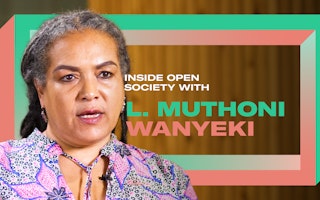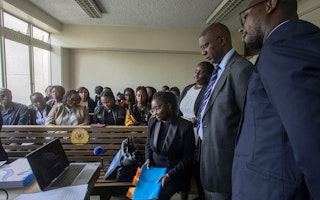Building a Women’s Movement in Southern Africa
By Tsitsi Mukamba
For the past few decades, the women’s movement in southern Africa has been under scrutiny for having lost its vigor. Back in the 1990s, the movement fought gender inequality in private and public spaces, and many governments listened.
International treaties like the Convention on the Elimination of All Forms of Discrimination against Women (CEDAW), also known as the “international bill of rights for women,” were ratified. Governments reformed laws that discriminated by gender, such as inheritance laws. Women’s ministries and gender policies were established.
But a decade later, the power of the women’s movement seemed to be waning. While major leaders and activists were brought in by governments to lead the new formations that had been put in place, overall governance structures remained largely patriarchal. The women’s movement, now largely driven by civil society and nongovernmental organizations, chose approaches that provided for women without addressing the reasons why women were lacking in the first place.
Tensions grew between old and young activists, with few young women occupying meaningful roles in the movement. Some young women viewed feminism as aggressive and uncomfortable, and did not like being called feminists even if they were involved in women’s rights work. Others reported that they were interested in being part of the movement, but there were few entry points to make a contribution. It became clear that the movement had not sufficiently invested in the young women’s involvement. Fresh perspectives were badly needed.
In response to these developments, the Open Society Initiative for Southern Africa launched the Young Women’s Voices Campaign in 2009. The campaign raises the political consciousness of young women and promotes their voices in the women’s rights agenda at all levels. Components of the campaign include the Southern African Young Feminist Leadership Course, the Southern African Young Women’s Platform, capacity building for young women’s networks and formations, and publishing a special issue of BUWA! Journal.
The Southern African Young Feminist Leadership Course looks at the meaning of feminism and how it shapes the politics of our everyday lives. It examines why men dominate in various spheres of life and what women can do to change this. By the end of 2014, the course will have been conducted in six countries, with over 400 young women participating.
By helping lay the groundwork, we’ve seen a rise in young women leaders in southern Africa. Some course participants have gone on to create new organizations addressing gender imbalance. OSISA has been there to provide support such as seed funding and advocacy tools. We aim to build these groups’ capacities so that they can sustain themselves beyond our support.
The following are a few examples of successful young women’s groups in southern Africa.
- Katswe Sistahood, Zimbabwe, advocates for sexual and reproductive rights.
- Swaziland Young Women’s Network, Swaziland, focuses on issues such as reproductive rights, gender, and leadership. Their campaigns include access to affordable sanitary ware for all women and the right to stay in school for girls who become pregnant.
- Institute for Young Women’s Development, Zimbabwe, works with young women in rural, farming, and mining communities, to participate in socio-economic and political processes. IYWD has fostered collaboration with the traditional court system in upholding the rights of young women and promoting peace and stability in the communities.
- Female Students Network, Zimbabwe, empowers female students in tertiary institutions to demand their space to acively participate in democratic processes. A considerable number of young women are now contesting and leading in student politics as a result of FSN awareness-raising workshops.
- Zimbabwe Young Women’s Network for Peacebuilding, Zimbabwe, promotes young women's contribution to peace-building and development. They have been pivotal in reaching out to young women to take part in political processes such as constitutional review and the elections. The organization also facilitates community dialogue among young women and policymakers.
- The African Woman Leadership Academy, Botswana, empowers women and girls through leadership skills training, mentoring, and network opportunities.
- Generation Alive, Zambia, engages other young women in leadership and decision-making, and builds the capacities and political awareness of young feminists.
- Girls Empowerment Network, Malawi, works to support and improve the well-being of vulnerable and marginalized girls. GENET advocates for the abolishment of harmful traditional practices such as child and forced marriages in Malawi.
- MOVE!, Malawi, facilitates dialogue among young women on issues that affect their daily lives and encourages them to create their own solutions to the challenges they face.
- Young Feminists Movement, Namibia, promotes sexual and reproductive health and rights for young women and uses music, poetry, painting, dance, monologue, and writing to tell women’s stories.
- Dynamique de la jeunesse Féminine, Democratic Republic of Congo, facilitates coordination and collaboration among a network of young women’s groups promoting and defending their rights.
- Southern African Young Women’s Platform, Regional, enables young activists to come together in person and online to network, share strategies, showcase their work, and get exposure to the women’s rights issues faced by various countries in the region.
The above approaches have contributed to a major injection of energy into the movement. Young women have established a place for themselves in the women’s rights agenda. Sexual and reproductive health and rights, which had previously not been high on the agenda, are now a priority.
But there are areas we can strengthen. One of our core strategies has been to build the skills and resources of leaders and organizations. Yet to do this effectively requires more time and resources than we have allocated in the past. We need to walk with an organization or leader for more than a couple of years to be confident we have equipped them with the right tools to stand on their feet and flourish.
Until December 2018, Tsitsi Mukamba was a program assistant for gender policy and advocacy at the Open Society Initiative for Southern Africa.


